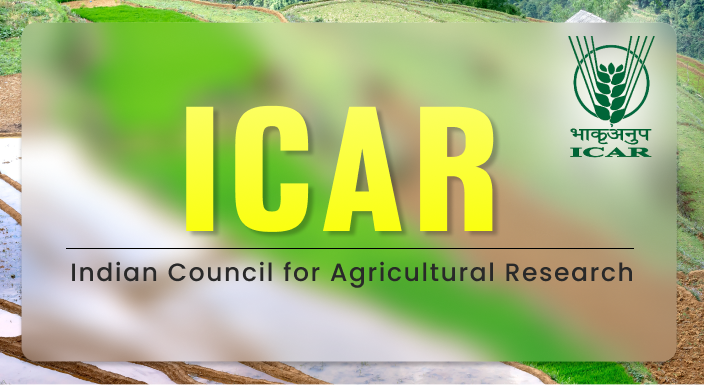ICAR- Indian Council of Agricultural Research
Indian Council of Agricultural Research (ICAR) is an institutional body for guiding, managing and coordinating science-led agricultural research and education. It bestowed the responsibility of conducting the ICAR All India Entrance Exam to the National Testing Agency. It is responsible to select eligible candidates for admission in Undergraduate, Postgraduate, and doctoral programs.
August 16th 2023, 12:51:46 pm | 5 min read

ICAR
Indian Council of Agricultural Research (ICAR) is the pinnacle of guiding, managing and coordinating science-led agricultural research and education. It bestowed the responsibility of conducting the ICAR All India Entrance Exam to the National Testing Agency.
Thus, it selects eligible candidates for admission in Undergraduate, Postgraduate, and doctoral programs.
ICAR (UG)
Eligibility:
Age
i. The minimum lower age limit for ICAR-AIEEA UG is 16.
ii. There is no upper age limit.
Education
i. Applicants must have a degree of 10+2 or equivalent from any affiliate or recognised institution.
ii. General and OBC candidates must obtain a minimum of 50% in aggregate.
iii. Candidates from Scheduled Caste, Scheduled Tribe, and Physically Challenged category must obtain at least an aggregate of 40% marks.
Mode of examination | CBT (Computer Based Test) |
Exam Duration | 2 hours 30 minutes |
No. of questions | 120 |
| Marking Scheme | 4 marks for each correct response -1 mark for each incorrect response (negative scoring) 0 for non-attempt |
Total Marks | 600 |
Questions according to chosen stream:
Stream A or PCM- Physics, Chemistry and Mathematics
Stream B or PCB- Physics, Chemistry and Biology
Stream C or PCA- Physics, Chemistry and Agriculture
ICAR (PG)
Eligibility:
Age
i. Candidates applying for ICAR-AIEEA PG must be at least 19 years old.
ii. There is no upper age limit.
Education
i. Applicants must complete their Undergraduate courses in any of these patterns- 10+2+5, 10+2+4, 10+6 or 10+2+3.
ii. General and OBC candidates must obtain a minimum of 60% in aggregate.
iii. Candidates from Scheduled Caste, Scheduled Tribe, and Physically Challenged category must obtain at least an aggregate of 50% marks.
iv. Also, candidates applying for the M.V.Sc program must complete their Bachelors of Veterinary Science and Animal Husbandry along with an internship.
Mode of examination | CBT (Computer Based Test) |
Exam Duration | 120 minutes (2 hours) |
No. of questions | 120 |
| Marking Scheme | 4 marks for each correct response -1 mark for each incorrect response (negative scoring) 0 for non-attempt |
Total Marks | 480 |
Question Type | MCQ |
Nationality: The nationality of the applying candidate should be Indian only.
Syllabus:
For Agri-Business Management:
Agri-Business Management (MBA) and Agricultural Marketing & Cooperation (M.Sc.).
For Animal Sciences:
Animal Husbandry/Dairy Sci, Animal Genetics & Breeding, Animal Nutrition, Veterinary. / Animal Physiology, Livestock Production Management, Livestock Products Technology, Poultry Science, Veterinary. & Animal Husbandry Extension, Livestock/ Veterinary/ Animal Husbandry Economics and Bio-Statistics.
For Veterinary Science:
Veterinary Anatomy/ Veterinary Anatomy & Histology, Veterinary Gynaecology and Obstetrics/Ani. Reproduction, Veterinary. Medicine (Clinical/Preventive), Veterinary Parasitology, Veterinary Pharmacology and Toxicology, Veterinary Pathology, Wildlife Science/ Wildlife Health Mgt., Veterinary. Virology, Veterinary. Immunology, Veterinary Microbiology & Immunology/Bacteriology, Veterinary Surgery & Radiology, Veterinary Public Health & Epidemiology/Veterinary. Public Health/Veterinary. Epidemiology/ Veterinary. Epidemiology & Preventive Medicine.
For Agricultural Engineering and Technology:
Soil & Water Conservation Engg. / Soil & Water Engg., Irrigation Drainage Engg, /Irrigation Water Mgmt. Engg., Post Harvest Technology/ Processing and Food Engg., Farm Machinery and Power Engg. And Renewable Energy Engg.
For Horticulture:
Horticulture, Vegetable Crops or Sci. / Olericulture, 8.3: Pomology/ Fruit Sci., Fruit Sci. and Horticulture Technology, Post-Harvest Technology of Horticultural Crops, Floriculture & Landscaping Architecture, Plantation Spices, Medicinal and Aromatic Crops.
For Physical Science:
Agricultural / Agro. Meteorology, Soil Science & Agricultural Chemistry/ Soil Conservation and Water Management/ SWC/ Irrigation and Water Management, Agricultural Physics, Agricultural Chemicals and Environmental Science
For Plant Sciences:
Plant Breeding & Genetics, Plant Pathology, Agricultural Microbiology/Microbiology, Seed Science & Technology and Plant Genetic Resources.
For Plant Biotechnology:
Plant Biochemistry/ Bio. Chem., Plant Biotechnology & Molecular Biology/Biotechnology and Plant /Crop Physiology.
